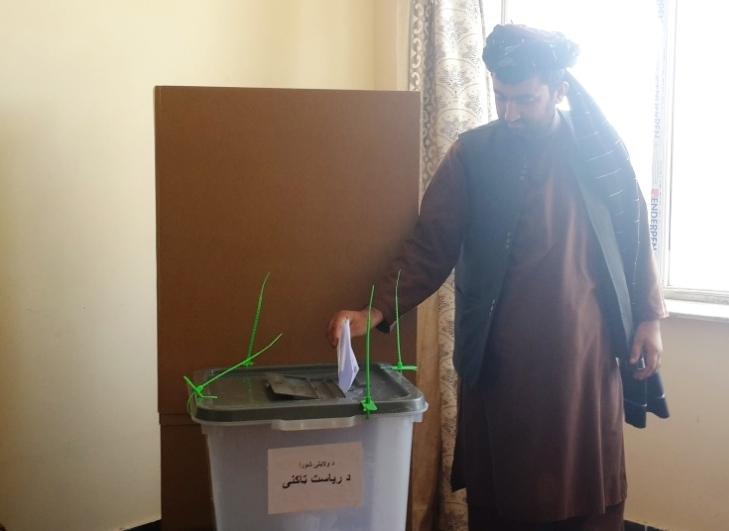KABUL, from participating in the election process.
The Electoral Reform Commission (ERC) for the first time on Aug 30 shared its suggestions about reforms in the electoral system with the government.
Some of the major suggestions include registration of voters, making the election bodies accountable, the presence of two foreigners on the Independent Election Complaints Commission (IECC), reservation of one seat at the Wolesi Jirga for Hindu minority, identification and shrinking of the constituencies.
Other proposals include distribution of the computerised Identity Cards, a 25 percent representation of women in provincial and district councils and invalidation of the current voter cards.
But the proposals only mention cancellation of voter cards that have already been distributed and rearranging voter lists.
The 3rd article of the ERC says: “Voter lists should be prepared based on their identity numbers. As some of Afghans have not obtained their identity cards so far, the Independent Election Commission (IEC) should provide lists of such people ahead of 2016 election.”
The article states eligible voters should personally go to polling stations and register their names. No one can register more than one time in polling stations.
Only those voters who have their names registered in polling stations can vote.
It says the government is responsible to provide facilities and encourage people to get identity cards. It is clear that electronic ID cards can control fraud at maximum possibility so the government should start the distribution of the e-ID cards as soon as possible.
The ERC members had said 13 million Afghans were eligible to participate in elections and vote, but 21 million voter cards had been distributed, a problem that needed to be solved.
Former IEC secretary Ziaulhaq Amarkhail said cancelling voter cards was a negative decision.
He said the distribution of new voter cards would be a difficult task and the process was expensive. He said as many as 20 million voter cards had been distributed since 2005 at a cost of $500 million.
He pointed out that the distribution of new voter cards was not possible in the current circumstances as militants controlled 60 percent area of Afghanistan and the war was underway in 160 districts.
The former IEC secretary said computerised ID cards could also be not designated as voter lists because 60 percent of people in villages lacked national ID cards.
Zakria Barakzai, head of the Afghanistan Democracy Watch (ADW), said preparation of voter lists in line with the computerised Identity Cards was a positive move but the practice would require more time.
He said the distribution of new ID cards to the entire nation would take years, while most of Afghans in far-flung areas still used old ID cards.
He believed the implementation of the ERC current suggestions would deprived most people, including women, from voting in coming polls.
Barakzai cited insecurity another factor that might make difficult the preparation of new voter lists in dangerous areas.
Mohammad Yusuf Rashid, the Free and Fair Election Foundation of Afghanistan (FEFA) head, praised the ERC work and said the commission had been able to meet its task in a short span of time.
He said the ERC suggestions were mostly positive and their implementation would help execute transparent elections in the country.
Rashid expressed his concern over the decreased number of commissioners on electoral bodies, saying every commissioner had his own responsibilities and the move raised questions that who would discharge the duty of the removed officials.
The reform panel, after month-long discussions with political parties, civil society activists and people of the all zones, submitted its proposals to Chief Executive Officer Abdullah Abdullah on Sunday.
Mohamamd Naeem Ayoubzada, the Transparent Election Foundation of Afghanistan (TEFA) chief, told Pajhwok Afghan News they welcomed the ERC’s suggestions, although incomplete and had their own flaws.
He said two suggestions about rearrangement of voter lists and distribution of computerised identity cards seemed not possible to be materialised in a short time.
The TEFA chief said if the government was not in a position to distribute the computerised identity cards then it should come with an alternate plan to make the upcoming elections transparent.
Sadiqullah Tawhidi, deputy head of the ERC, said people with national ID card could register themselves for the new voters list in the election commission office situated in their own area, while those who don’t have national ID cards they could register themselves with any other documents that could ensure their nationality.
He, however, said that it was the responsibility Independent Election Commission (IEC) to introduce a simple manner for the voters list.
nh/mds/ma
Views: 0









GET IN TOUCH
NEWSLETTER
SUGGEST A STORY
PAJHWOK MOBILE APP